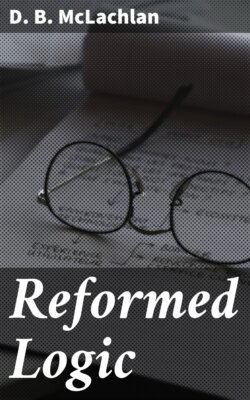Читать книгу Reformed Logic - D. B. Mclachlan - Страница 7
На сайте Литреса книга снята с продажи.
III—DIFFERENCES BETWEEN SUBSTANTIAL AND
METAPHYSICAL LOGIC
ОглавлениеTable of Contents
All the current academic metaphysic is ideal. Materialists, when they attempt to explain thought, fail to attach it properly to the body, or to account for that large and important division of mental activity which has no bearing, direct or indirect, on bodily welfare. They drop their materialism at an early stage of their enquiry and continue on the metaphysical method.
Hence in none of the current systems is there any true principle of arrangement in the treatment of logical phenomena. Unless we know the use of a thing we cannot describe it, let alone explain it. We know not the relative importance of its parts, and we arrange them according to superficial resemblances, or on some arbitrary principle which conceals instead of revealing their meaning.
Substantial philosophy alone possesses a principle of coherence. The facts of consciousness are determined by anterior facts of substance, and there can be only one true mode in which to present them—they must follow and reflect the substantial order. They will thus appear as a consecutive and coherent system of ideas, no one of which could be otherwise placed without damage to the whole. This is perhaps the most important respect in which substantial logic differs from others.
The doctrine of Categories has to receive full development in order to elucidate the genesis of the 'material world.' Except to a substantialist the categories have no particular value, and so they are barely mentioned in the academic systems.
The theory of Reasoning or Dialectic (logic in the narrower sense) given in the following chapters, will be found totally different from the academic. It does not merely state in other words or metaphors the doctrines laid down in works of the Aristotelian type,—it declares that the theory of reasoning taught in these works is altogether false. Our argumentation is not conducted in syllogisms, either tacit or explicit. This has been suspected by several critics of logic, but no attempt has been made to substitute a more correct theory and method. Of course logicians do not always reason wrongly, and true arguments may be stated in the syllogistic form. What I mean is that logicians nowhere tell us in what right reasoning essentially consists, and for want of a distinct notion on the subject they all of them occasionally admit as valid, arguments that are not so.
The main dogma of substantialism should be kept in view in reading the following pages. It is mind alone that is conceived as having solidity and energy: material things are temporary forms of our consciousness; they have length and breadth but no depth, and they are without energy, even passive resistance. If an object cannot be removed at pleasure, what resists us is the other mind causing that object, not the object itself.
As far as possible I have utilised the existing logical terminology. But substantialism has notions which require special technical words, and I have not hesitated to invent such when necessary. On the other hand, I have rejected the latinisms of current logic, which have never been assimilated by modern languages. The English language is good enough for all the purposes of logic.
1: The mental substance is the fifth essence of the initiate Greeks and of Alchemists. They also called it chaos and first matter. 'Man was made of that very matter and chaos whereof all the world was made, and all the creatures in it: which is a most high mystery to understand, and must, nay is altogether necessary to be known of him that expecteth good from this art, being the ground of the wisdom thereof. Foolish men, nay they that the world holds for great doctors, say and tell it for truth, that God made man of a piece of mud, or clay, or dust of the earth, which is false; it was no such matter, but a Quintessential Matter which is called earth, but is no earth.'—De Manna Benedicto.
2: See Stricker's Manual of Histology; Bioplasm, and other works, by Dr. Lionel S. Beale, M.B., F.R.S.; and an article on the New Psychology, by A. Fouillé, in the Revue des Deux Mondes for October 15th, 1891.
